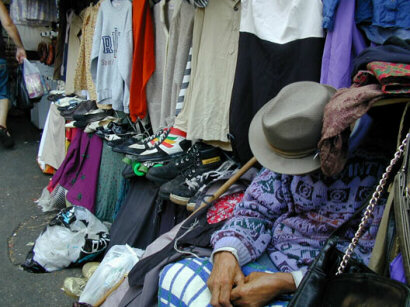 Christmas in Jerusalem
Christmas in Jerusalem
I had forgotten it was Christmas, thank God. It was only on the bus that I remembered -- I was riding on the number 18, coincidentally the same line on which Matt Eisenfeld was killed about ten years ago, when he was doing then what I was doing now: heading to the central station to catch the express to Eilat. Nothing fancy; just a nice vacation in the sun. I made it ok.
Paradise is forgetting it's Christmas. I can't stand the holiday; the Santa Claus myth, the C-major music, and of course all the advertising. The holiday itself is fine -- a pagan solstice ritual, grafted onto the new religion, but still retaining the imagery of the goddess (trees, lights in winter), I quite like the religious themes. But Christmas is indelibly linked, for me, with exclusion -- with not having the tree, not owning the symbols of green and red, tinsel and reindeer. Today the zeitgeist of political correctness has reduced Christ's birth to "Holiday" (the "war on Christmas" tempest in a teapot that is the latest bugaboo of Bill O'Reilly and his ilk) and one finds today debates as to whether the holly plant is a Christian symbol or not. But for me, the "mas" was the problem, not the "Christ." At least the story of Jesus was something real, something that mattered. Take it away, and all that's left is the alienation.
At its core, secular Zionism was about the belief that there should be a place in the world where Jews are normal. This is what the lefties miss when they talk about a "bi-national state" -- that without the specifically Jewish character of Israel, Jewishness ceases to be normal. It becomes what it is in every other country in the world, the dozen Arab ones included: an aberration, a difference. Maybe a productive one -- but not a chosen one, and therefore not entirely just. We can't be normal until being Jewish is normal, the Zionists said, and the only way for that to be is for there to be a place where Christmas is extra, but Chanukah is taken for granted.
Christmas in Jerusalem is a fulfillment of that dream. Of course, only a few miles south, it's Christmas in Bethlehem. Manger Square is an hour's walk from my apartment, if that, but of course you can't walk there anymore, at least not without crossing the Separation Wall, somewhere, and moving from Areas A to B to C. There, normalcy is almost impossible, as it has been since Camp David failed and the second intifada began. Of all the predicaments the conflict has brought about, it is this one which depresses me the most. Almost everyone can be reasonable about politics when their lives are reasonable, but when it's impossible to have a normal life, who remains moderate?
I've been feeling politically depressed for other reasons, too.
First, and largely unreported in the Western media, there has been a continual bombardment of southwestern Israel by Islamic Jihad forces in the Gaza strip. My partner, Adam, is on a retreat within Qassam range of Gaza, and I'm petrified. And now, like guests who heard about the fun at the New Years party, come Katyushas from the Syrian-backed Hezbollah militants (or perhaps Al Qaeda) in Lebanon, forcing residents of Kiryat Shmona into bomb shelters. This kind of shelling has been happening, on and off, for years, but is especially depressing now because it shows how impossible a truly airtight peace really is, and how the "Disengagement," which I and most Israelis supported, may yet blow up in our faces, as the Israeli Far Right claimed it would. Those Qassam rockets -- now being aimed at Ashkelon's power plant, where they could cause massive damage -- are being fired from the ruins of three evacuated settlements, Elei Sinai, Dugit and Nisanit. True, there were Qassams before the Disengagement too, but they couldn't reach as far. Those settlements really were a security barrier, and now they're gone.
Suppose there's a real Disengagement from the West Bank, as of course there has to be for any real peace to take hold. Qassams fired from Qalqilya, a hotbed of Islamist sentiment that abuts the narrowest part of Israel, could hit almost all the Tel Aviv suburbs. They could blanket the whole of Israel, since the country's only 9 kilometers wide there. Nine kilometers -- you can walk that in a couple of hours, tops. I used to walk half that far to high school, when I stayed late and couldn't get a ride home. No matter how high the Security Barrier/Separation Fence/Apartheid Wall/Call-it-what-you-will-but-it-keeps-me-safe-at-Cafes is, it can't stop the missiles.
Nor can the Palestinian Authority. Weakened, corrupt, and seemingly perpetually bankrupt, it lacks either the manpower or the credibility to really "crack down on terrorists," as Israel constantly demands. There are achievements: last week, the PA and the Israeli army jointly stopped a massive car bomb from detonating in a tunnel a few miles south of where I write these words -- another major incident scarcely reported in the Western press. But Gaza, for those who haven't checked up on the place since last August, is -- in the words of one P.A. official -- the new Somalia: lawless, anarchic, and riddled with constant gun battles, as gangs fight it out for supremacy. Kidnappings are routine (in a perverse twist, one of the primary demands that kidnappers make is a job with the Palestinian security forces), bribery is widespread, and the idea of the PA cracking down on Islamic Jihad -- let alone Hamas, which is about to score huge wins if the Palestinian election takes place in an open and fair way -- is about as likely as George Bush cracking down on the Christian Coalition.
Presumably, increased support from the international community, coupled with tangible results in the peace process, will bolster Abu Mazen and his fellow moderates. Right now, though, he can't even protect his own house (which got shot up this week), and power is really in the hands of local political bosses, mobsters, and Islamist kingpins. Surely it's reasonable for Israel to demand some action against the Islamic Jihad murderers and their ilk. But from whom?
The second reason to be depressed about the prospects for peace is that even if these practical problems did not exist, the "peace process" seems to mean totally different things to Palestinians and Israelis. Recently, I was part of a trip to Bethlehem, meeting with Palestinian peace activists and ordinary (though hand-picked) children and adults. What became immediately clear was that, while we all said we wanted peace, the word had almost no shared meaning. For every Palestinian who spoke about it -- and these were the peaceniks -- "peace" meant a full withdrawal from all Palestinian land, which for now at least means the West Bank. For Israelis, "peace" generally means some kind of negotiated agreement, and an end to violence on both sides. These are different things, and no amount of singing songs can change that.
Moreover, I found, among the Palestinians I spoke with, an astonishing "responsibility gap." For example, no one believed that the Fence/Wall was really about security; they all said it was a transparent attempt to steal Palestinian land. Often, this claim was backed up by lies -- we were told, over and over again, that the wall has not stopped terrorism, but there are documented cases every week of it doing just that: of armed infiltrators caught trying to cross over, and of terrorists stopped at checkpoints. We were told that "flying checkpoints," which appear at random places at random times, were merely tools for harassment and disruption of economic life. But today, a suicide bomber was caught at a "flying checkpoint" near Tulkarm, and blew himself up, killing a 21-year-old Israeli soldier. The bomber was bound for Tel Aviv -- apparently for a children's Chanukah party.
 Other times, the general claim -- that the wall, the checkpoints, and the
rest of the odious, intrusive Israeli security apparatus are all really tactics of
ethnic cleansing -- rested not on untruths, per se, but on omitted facts.
In the photo at left, for example, is the portion of the Wall that runs alongside
Bethlehem. Here, the route obviously diverges not only from the 1967 line,
but even from the borders of southern Jerusalem. It cuts away from the city,
includes on the Israeli side an olive grove (visible in the photo, and said to be owned by
one of the Bethlehem churches), and then backs right up against homes in Bethlehem proper. It's a hideous, awful beast, and so it's easy to impress left-leaning Americans like us that it's a nasty attempt to ethnically cleanse the West Bank, by slowly cutting Palestinians off from their livelihood.
Other times, the general claim -- that the wall, the checkpoints, and the
rest of the odious, intrusive Israeli security apparatus are all really tactics of
ethnic cleansing -- rested not on untruths, per se, but on omitted facts.
In the photo at left, for example, is the portion of the Wall that runs alongside
Bethlehem. Here, the route obviously diverges not only from the 1967 line,
but even from the borders of southern Jerusalem. It cuts away from the city,
includes on the Israeli side an olive grove (visible in the photo, and said to be owned by
one of the Bethlehem churches), and then backs right up against homes in Bethlehem proper. It's a hideous, awful beast, and so it's easy to impress left-leaning Americans like us that it's a nasty attempt to ethnically cleanse the West Bank, by slowly cutting Palestinians off from their livelihood.
Until one remembers (and I was the only one in our group who mentioned it aloud) that that selfsame olive grove used to hide snipers who shot at windows in residential Gilo, which can be seen in the background of the photo. Gilo is a neighborhood of Jerusalem, but it was built over the 1967 line, so most Palestinians call it settlement; still, it houses families, not soldiers. If one believes that targeting of such civilians is wrong no matter the cause, then one must ask what can be done to stop it. Personally, I starting thinking: if this wall really is to be the border, then the extra mile or so that the olive grove provides... hey, wouldn't that be just the buffer zone needed to shield the nice, left-leaning German Colony where I live from jihadist Qassams launched from Bethlehem central? We privileged Americans sit in our pleasant cafes, surfing the internet and eating muffins while debating the merits of Israeli policy which other people die for. But all the while, we're well within range of those rockets, which, if what's happening in Gaza is any indication, will find their way into the West Bank the moment Israel withdraws. So, I'll take the extra half mile, thanks, until it can be shown that the rejectionists in the Palestinian community can really be stopped by the moderates. And in the meantime, the wall blocking the olive grove shields sleeping children from gunfire.
Of course, the people who lose the most are those ordinary men and women on the Palestinian side who would like to harvest olives without a military escort, or would like a view from their window of something other than a concrete wall. But it's their leadership that rejected Camp David, refused to crack down on rejectionists, and has caused the present situation to come to pass. Blame Israel and its settlements all you like, but shooting at sleeping children is still shooting at sleeping children. Right?



A Parable after my hard drive crashed
Zalman Schachter-Shalomi
Christmas in Jerusalem
Jay Michaelson
Carobs
Elisha Porat
Dear Mr. Pinter
Dan Friedman
The Nuclear Physicist Gives his Son a Haircut
Hanan Harchol
Brodsky Begins, Part Two
Adam Mansbach
Archive
Our 870 Back Pages
Zeek in Print
Subscribe now!

About Zeek
Mailing List
Contact Us
Subscribe
Tech Support
Links

From previous issues:
The Aesthetics of Power
The Goats of War
Fresh Baked Bread
Michael Shurkin
Jennifer Blowdryer
Jay Michaelson